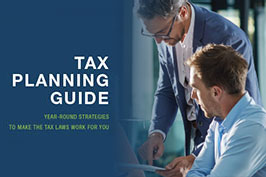263A cost capitalization calculations
IRS Code Section 263A details the uniform capitalization rules (UNICAP) that business owners need to use in their calculations for capitalizing their costs for tax purposes. This section of the tax code applies to retailers, manufacturers, and wholesalers who take in, on average, at least $10 million in gross receipts per year. The regulations surrounding 263A cost capitalization can vary and are dependent upon what type of business you’re engaged in.
Section 263A describes how businesses must apply specified direct and indirect costs to the value of their inventory versus simply deducting them as current-year expenses. The result is a delay of tax deductions for certain costs until the inventory is sold.
Costs that are required to be capitalized include:
- Direct Costs – these are direct material costs and labor costs that become an integral part of the property. These normally would already be included in inventory; as part of a cost accounting system.
- Indirect Costs – all costs that are not defined as direct above, but directly benefit or are incurred through the production/construction activity.
- Service Costs – a type of indirect cost that can be identified specifically with a service department. These are usually general and administrative expenses.
Testimonial
Procedures
Producers or purchasers of inventory must look at each item of expense on their profit/loss statements to determine whether all or a portion of that expense falls under one of the three categories of 263A cost capitalization.
In November of 2010, the IRS offered automobile dealerships two “safe harbors” relating to UNICAP. The first one allows dealerships to elect to treat all handling and storage costs incurred at certain of their sale facilities as fully deducted when incurred. The second safe harbor permits dealers to elect to be treated as resellers and, therefore, be able to deduct the cost of all labor performed on both customer as well as dealership owned vehicles.
The problem is that not all dealerships have become compliant or know how to become compliant with these UNICAP rules and have failed to address the UNICAP requirements when preparing and filing their tax returns. So, it’s important to enlist the services of a firm that provides a full range of accounting, audit, business advisory and tax services for automobile dealerships.
CTA – Your tax planning guide

Getting assistance
At GYL, our specialists will work to protect your assets, identify opportunities for growth, and present tax saving strategies as well as minimizing tax liabilities. In addition to providing accounting services for car dealerships, our clients also have the benefit of having easy access to the expertise and resources of our national organization, CPAmerica International and Crowe Horwath, the international arm of CPAmerica.
Automobile dealerships have unique tax filing requirements, such as those involving IRS Section Code 263A, as well as unique accounting requirements. If you would like more information about our services, call one of our Southern California offices to schedule a free consultation.
